Newswise — ATLANTA, August 1, 2022 — A new study led by researchers at the American Cancer Society (ACS), shows serious smoking cessation activity declined among adults in the United States immediately after the onset of COVID-19 and persisted for over a year. Declines in attempts to quit smoking were largest among persons experiencing disproportionately negative outcomes during COVID-19, including Black people, people with comorbidities, middle-aged people, and lower educated people. The data was published today in the Journal of the American Medical Association (JAMA) Network Open.
“Smoking cessation is an urgent public health priority given that smoking is associated with an increased risk of severe COVID-19 outcomes and at least 12 cancers,“ said Dr. Priti Bandi, principal scientist, risk factors & screening surveillance research at the American Cancer Society and lead author of the study. “It is essential to re-engage persons who smoke in serious attempts to quit smoking, considering a typical smoker tries to quit on average six times before being successful.”
Researchers conducted this cross-sectional study using 2011 to 2020 data on close to 800 thousand individuals who had smoked in the past year from the nationally representative Behavioral Risk Factor Surveillance System (BRFSS) survey. Representative retail scanner sales data between January 2017 and July 2021 for 1004 unique nicotine replacement therapy (NRT) universal produce codes in 31 U.S. states from NielsenIQ were also used.
The results showed the annual prevalence of past-year quit attempts among U.S. smokers decreased for the first time since 2011, from 65.2% in 2019 to 63.2% in 2020. Declines began in the first quarter of 2020 and quit attempt prevalence remained depressed through the year. The report also shows relative decreases between 2019 and 2020 were the largest among persons known to have experienced disproportionately negative outcomes during the COVID-19 pandemic, including middle-aged persons, those with 2 or more comorbidities, Black persons, and lower educated persons. According to the authors, observed sales of NRT products from representative retail scanner data in 31 states declined by between 1% and 13% compared to expected sales. Declines began immediately after COVID-19 onset (April 2020) and persisted through the first quarter of 2021.
“These results remind us how critical it is for clinicians and healthcare systems to support persons who smoke with evidence-based quitting strategies,” said Dr. William Dahut, chief scientific officer at the American Cancer Society. “Such efforts must be particularly targeted to persons disproportionately impacted by the COVID-19 pandemic, including Black persons, middle-aged persons, those with comorbidities and lower educated persons.”
“Tobacco is the number one, preventable cause of cancer and is responsible for up to one-third of all cancer deaths,” said Lisa Lacasse, president of the American Cancer Society Cancer Action Network (ACS CAN), ACS’s advocacy affiliate. “We know quitting tobacco isn’t easy, so we must do everything in our power to ensure individuals trying to quit have access to the cessation services they need. By ensuring Medicaid programs cover all FDA-approved cessation treatments and services in every state and that state tobacco prevention and cessation programs are adequately funded, we can help more people quit and help reduce cancer disparities driven by this deadly product.”
Dr. Ahmedin Jemal is senior author of the study. Other ACS authors include: Dr. Samuel Asare, Dr. J. Lee Westmaas, Dr. Anuja Majmundar, Dr. Xuesong Han, Zheng Xue, and Dr. Nigar Nargis.
Resources from the ACS on quitting smoking can be found here.
# # #
About the American Cancer Society The American Cancer Society is on a mission to free the world from cancer. We invest in lifesaving research, provide 24/7 information and support, and work to ensure that individuals in every community have access to cancer prevention, detection, and treatment. For more information, visit cancer.org.
MEDIA CONTACT
Register for reporter access to contact detailsCITATIONS
JAMA Network Open

